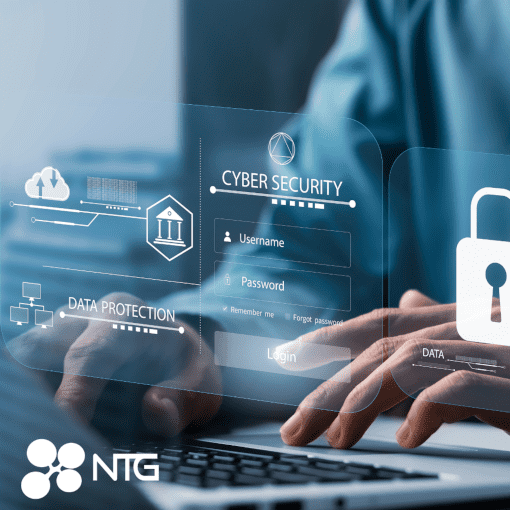There is a greater need than ever for prioritizing cybersecurity in 2022. In today’s fast-paced world, businesses are faced with increasing threats, and technological advances increase at an alarming rate. Thus, it is crucial to have a reliable security system in place.
For a simple hack of a company’s system, we’ve all heard about companies being fined a lot of money or even having to cease doing business. It is simply too easy to ignore the risks of virus attacks and scams out there since the internet teems with valuable data. Your company and your livelihood might be put at risk if you let it happen.

Online security or Cybersecurity – what is it?
It aims to protect data, devices, storage sources, and other elements in cyberspace against attacks. On the other hand, online security or information security provides a guard against all threats, no matter whether the data is digital or analog. There are usually three main areas of IT security: cybercrime, digital fraud, and crime prevention. In contrast, a good online security program will safeguard your data from illicit access, alterations, and disruptions.
Experts handle IT security issues on a daily basis. Hiring experts who have had special training in dealing with advanced persistent threats (APTs) is crucial. However, online security plays a vital role in the safety of all data on a computer network. Threats and attacks are dealt with by prioritizing resources.
Cloud computing: what is it?
The concept of cloud computing may seem obscure, but it can be put in the simplest terms as follows:
In digital terms, it refers to a network service that delivers services over the internet directly.
The definition of cloud computing can exist in many ways, and they all refer to the same thing. Five major factors have a direct impact on the outcome:
- The network
- Managing data
- Data storage
- A service
- The devices
Cyber-attacks – what are they?
In cyber-attacks, you are attempting to exploit the misuse of technology or a network that is part of your business. The purpose of a cyber attack is to either steal, leak, or hold hostage your data by using malicious code to compromise your system, logic, or data. Every business and firm needs to take steps to prevent cyber attacks from coming to pass. The more valuable your database is, the more vital it is to keep it safe. Because of that, you must have a Cybersecurity Managed Services provider on hand!
Listed below are some data leaks and cyber-attacks that are common:
- Defacing of websites
- Misuse of the Instant Message Service
- Access breach
- Theft of intellectual property or unauthorized access to IP
- Infiltration of systems
- A laptop or a mobile device is missing from you
- Attacks on websites that cause denial-of-service or distributed denial-of-service
- Fraud, extortion, identity theft
- Spam, spyware, trojans, phishing, spoofing, phishing, malware, and other types of attacks
- Spying on passwords
- Exploits for public and private Web browsers
The key to success is prevention, and that’s what we’re going to share with you in this article: Boost Your Business IT Security with IT Managed Services. You will learn about the vitality of securing your firm well and how to do that.
Educate your team
An easy way for attackers to find the data you hold on your employees who work for you. Their goal is to send fake emails posing as people inside your firm claiming to be from the company. There will then be a request for either detail about you or the use of some files, and they will ask for either one. It’s easy to fall into the trap of trusting links when they appear legitimate to a naive eye. As a result, employees need to know they are aware of what is going on. A good way to safeguard your company from cyber-attacks and data breaches, in general, is to educate your staff about cyber threats.
To achieve this, they must:
- Make sure links are safe before clicking them.
- Make sure that you have the correct recipient’s email before sending the message.
- Send sensitive data only if you are sure that the recipient will receive it safely. You should probably be cautious if you receive an unusual request. Doing so is better than not doing it.
- Ensure that the person in question is reachable over the line before taking any action regarding the request.
- A business of any size can benefit. It can benefit from Leaf’s cyber safety training. You can find out more by contacting Tampa-based IT consulting services and engineering firms.
One of the bigger challenges that voice vendors have had to overcome is the user friendliness of their interfaces. As more voice vendors move to the cloud, they are seeking to minimize complexity and increase the simplicity with which their users interact with their products. For administrators, this means having access to all the tools they need in an easy to access format, to service their internal customers. For users, this means a design that allows for easy adoption of the product in terms of overall usability, a more attractive interface, smarter integration with existing applications, allowing a better and more memorable user experience.
Maintain updated systems and software
It is common for cyber-attacks to happen when you do not have up-to-date versions of specific systems or software, which leaves them vulnerable. There are weaknesses in your network that hackers exploit, making it easier for them to penetrate your network and get access to the data. The sooner you find out about an attack, the better. It’s almost hard to prevent once they are already there. Due to this, it is a wise move to get a patch management system set up. It will perform all system and software upgrades. Then, you will ensure that your system remains up to date and resilient.
Protect your endpoints
A device that connects to a network remotely is known as an endpoint and secures endpoint protection. Corporate networks can pose a security threat to mobile devices, tablets, and laptops linked to the internet. Also, software that protects endpoints against these threats is vital for these paths.
Protect your network with a firewall
High-tech data breaches are so diverse that they can fall into many different types. The list goes on and on, and new threats emerge on a daily basis. The best way to defend yourself from online threats is to install a firewall on your network. A firewall prevents malicious actions from being launched against your network and systems in the first place.
Data backups
You should back up your data if you want to minimize your downtime, data loss, and loss of financial resources in the event of a disaster. The reason for this is that many companies also offer cloud services to their clients.
Keep track of your system access.
It may seem shocking to you, but there are some attacks you can receive on your system which aim right at you. A vital aspect of network security is knowing the people with access to the network and their rights. A USB key that contains malicious files can simply be plugged into one of your computers by someone walking into your office. Your entire network can be accessed or infected if you allow them access. Your computer should be accessible only to those with the right to access it. It’s very crucial to have a security system installed so that cybercrime does not take place.
Security on Wi-Fi
As we move forward to 2022, there will be an increasing number of devices that are Wi-Fi ready. That is the case and what poses the greatest danger. Whenever a device connects to a network, it has the potential for infection with malware. The entire network of your business is at risk if this infected device connects to it. To protect your systems, making sure that your Wi-Fi networks are secure and hidden is a vital step. In today’s world, where technology advances day by day, many devices are capable of connecting to a network to try to access it.
Accounts for employees
All applications and IT infrastructure require employees to have their logins. Your business might be at risk if multiple users use the same credentials. Each staff member should have their login, which will reduce the number of attacks you have to deal with. There will only be one login per day per user, and each user will only have one set of logins. You’ll also get better usability, as well as greater security.
Managing access to the system
Business owners and employees face the risk of using corporate devices to install software on their systems that could cause a security breach. Also, keeping your network safe depends on the control of admin rights and the ability to block access to certain data by your staff. The business you run is yours. Make sure it is protected!
Secure passwords
A single password can be dangerous if you use it for everything. The hacker will now access all your data, including which applications you use, once they have figured out your password. Keep your passwords unique on every device you own. A good way to protect yourself from internal and external threats is to keep your passwords updated often.
There are many things to consider if you are trying to protect your business from cybercrime and cyber-attacks. It’s easy to become deluged by the amount of information out there, more so in cases of conflicting advice. Your business and employees should have an employee benefits package and Security operations that work for both.
References:
- https://circlemsp.com/10-ways-a-managed-it-service-provider-can-prevent-cyber-attacks/
- https://www.ccsinet.com/blog/how-to-improve-cybersecurity-for-your-business/
- https://www.nsiserv.com/blog/it-managed-services-provider-improves-your-bottom-line
- https://www.digitaloperatingsolutions.com/managed-it-services-for-business/
- https://www.lantech.ie/blog/can-a-business-benefit-from-managed-it-services-a-closer-look

